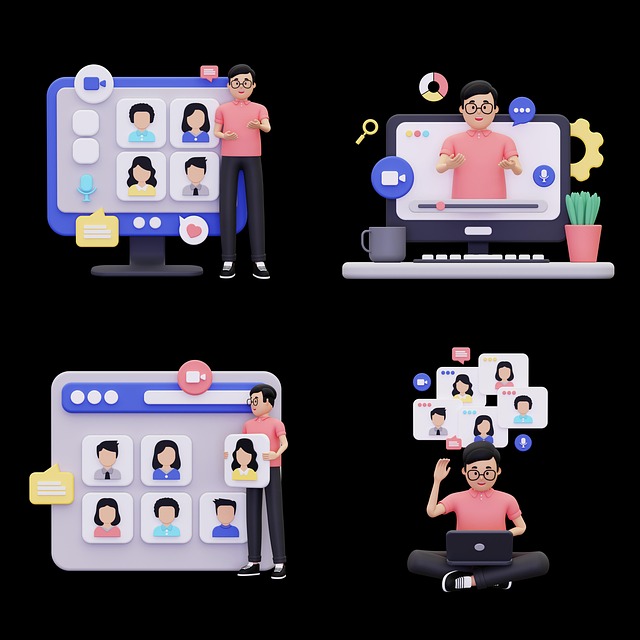Ecommerce AI for digital marketing leverages artificial intelligence to personalize content based on user data, enhancing engagement and satisfaction. AI chatbots provide instant support and gather insights, refining content delivery. Strategic integration involves identifying key areas like personalized content and automated customer service, choosing aligned AI technologies, and tracking KPIs such as conversion rates and chat interaction rates for continuous improvement.
In today’s competitive digital landscape, personalized content delivery is crucial for engaging customers. Ecommerce AI technology revolutionizes this process, offering dynamic and tailored experiences that drive conversions. This article explores the power of AI in enhancing content delivery within ecommerce. We delve into understanding AI personalization, uncovering the numerous benefits it brings, providing practical implementation strategies, and defining key performance indicators for success. Discover how ecommerce ai is transforming digital marketing.
- Understanding Ecommerce AI for Personalization
- Benefits of AI in Content Delivery
- Implementing AI: Strategies and Tools
- Measuring Success: Key Performance Indicators
Understanding Ecommerce AI for Personalization

In the realm of digital marketing, Ecommerce AI for personalization has emerged as a game-changer, revolutionizing how businesses interact with their customers. By leveraging artificial intelligence (AI), ecommerce platforms can now offer tailored experiences that cater to individual user preferences and behaviors. AI agents, such as intelligent chatbots, analyze vast amounts of data, including browsing history, purchase patterns, and even social media interactions, to create dynamic and personalized content. This level of customization enhances customer engagement and satisfaction.
The integration of AI in ecommerce goes beyond mere personalization. AI chatbots, for instance, serve as virtual assistants, providing instant support and guidance to shoppers, answering queries, and offering product recommendations based on real-time conversations. This not only improves the overall shopping experience but also allows businesses to collect valuable insights into customer needs and preferences, further refining their personalized content delivery strategies.
Benefits of AI in Content Delivery

The integration of Artificial Intelligence (AI) into content delivery systems is transforming the way businesses engage with their customers in the digital marketing landscape. Ecommerce AI technologies offer a multitude of benefits, enhancing user experiences and optimizing sales strategies. By leveraging machine learning algorithms, AI can analyze vast customer data to create personalized content tailored to individual preferences. This level of customization ensures that each customer receives relevant information, significantly increasing engagement rates.
Moreover, AI-driven systems enable efficient optimization of marketing funnels, from initial customer interaction to post-purchase support. Chatbots, powered by AI, provide 24/7 assistance, instantly addressing client queries and offering product recommendations. This real-time interaction not only improves customer satisfaction but also aids in generating leads and driving ai sales. With its ability to learn and adapt, AI ensures that content remains dynamic and up-to-date, keeping customers invested in the brand’s offerings.
Implementing AI: Strategies and Tools

Implementing AI in ecommerce isn’t a one-size-fits-all endeavor; it requires strategic planning and tailored tools to unlock its full potential for digital marketing. The first step involves identifying key areas within your business where AI can provide value, such as personalized content delivery, predictive analytics for inventory management, or automated customer service through chatbots. Once these areas are pinpointed, choose the right AI technologies and platforms that align with your specific needs.
Popular strategies include leveraging machine learning algorithms to analyze customer behavior and preferences, enabling dynamic product recommendations at every touchpoint in the buyer’s journey. An effective ecommerce ai for digital marketing strategy also integrates natural language processing (NLP) for enhanced customer communication, whether through personalized emails or conversational AI in your sales funnel. Additionally, automation tools streamline repetitive tasks like email campaigns and order fulfillment, freeing up resources for more strategic initiatives while improving overall operational efficiency (ecommerce automation).
Measuring Success: Key Performance Indicators

Measuring success is paramount when implementing ecommerce AI for digital marketing strategies. Key Performance Indicators (KPIs) such as conversion rates, customer engagement levels, and average order value serve as vital metrics to gauge the effectiveness of personalized content delivery. By tracking these KPIs, businesses can identify trends, pinpoint areas needing improvement, and fine-tune their AI models accordingly.
For instance, a well-optimized chatbot automation system within an ai funnel can significantly enhance customer experience by providing instant support and tailored product recommendations. Monitoring chat interaction rates, click-through rates from suggested products, and subsequent purchase conversions allows for data-driven adjustments to the algorithm, ensuring the content delivery remains relevant and persuasive in the competitive ecommerce landscape.
Personalized content delivery through advanced eCommerce AI tech is revolutionizing digital marketing. By leveraging machine learning algorithms, businesses can offer tailored experiences to customers, enhancing engagement and conversions. Implementing AI strategies not only benefits customer satisfaction but also provides valuable insights into consumer behavior. As the field evolves, tracking key performance indicators (KPIs) will be vital to measure success and stay ahead in the competitive digital landscape dominated by ecommerce ai for digital marketing.
